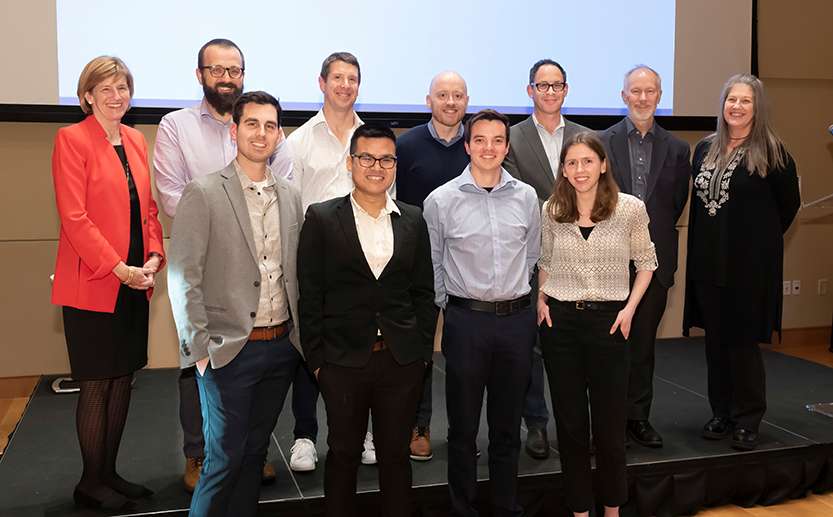
Duke University School of Medicine celebrated exceptional graduate PhD students March 7 with Dean’s Award for Research Excellence (DARE) to honor their achievements in basic science research.
Previously known as the Chancellor’s Award, this year the Office of Biomedical Graduate Education recognized those who are advancing understanding of brain function, cancer treatment and neurological disorders.
Mary E. Klotman, MD, executive vice president for health affairs and dean of the Duke School of Medicine, opened the ceremony by emphasizing the collaborative nature of scientific discovery. “It takes a team,” she said, highlighting the mentors, families and laboratory teams who empower students to reach their full potential. “To have an institution like Duke work, it takes a team of individuals who are passionate about our missions.”
She continued: “Students play a crucial role in driving scientific progress with fresh ideas that challenge established paradigms. Your accomplishments are even more remarkable given the circumstances of conducting research during the COVID-19 pandemic.”
A physician-scientist, Klotman witnessed the emergence of HIV in the 1980s and the urgent need for scientific understanding. The experience, she said, solidified her commitment to biomedical research.
“I was inspired by the potential for basic science to lead us to tangible breakthroughs,” Klotman said.
The 2023-24 DARE award recipients include:
Robin Blazing, a doctoral candidate in the neurobiology lab of Kevin Franks, PhD, studies neural circuits and behavior. She used optogenetic stimulation experiments to research the complex workings of the olfactory system. Focusing on the piriform cortex and other scent-processing regions of the brain, she uncovered how the brain transforms scents into information and odors are coded.
Josh Ginzel, a Department of Cell Biology doctoral candidate in the laboratory of Joshua Snyder, PhD, revealed the early seeds of breast cancer may be sown decades before diagnosis. Amplification of the human epidermal growth factor receptor 2 (HER2) is one of the earliest pivotal events in breast cancer development and Ginzel demonstrated that each distinct HER2 isoform determines a unique course of tumor growth. Known for mentoring others, Ginzel’s research provides insights into detecting and treating cancer at an early stage.
Duc Huynh, PhD, a biochemistry graduate student mentored by Mike Boyce, PhD, successfully defended his thesis moments before receiving his award. A member of BioCoRE, Huynh is committed to increasing diversity in biosciences and his research has improved understanding of neurofilament function. His work linking O-GlcNAc modification with abnormal neurofilament assembly could offer new treatment targets for Charcot-Marie-Tooth disease and other neurological disorders.
Shane Killarney, a doctoral student in the Medical Scientist Training Program and the Molecular Cancer Biology program, was mentored by Kris Wood, PhD, while investigating resistance to targeted cancer treatment. When cancers resist these drugs, they can paradoxically rely on them for survival, suggesting intermittent treatment might slow resistance. Through mathematical modeling and identifying a biological mechanism involving the loss of a transcription factor called microphthalmia-associated transcription factor, Killarney and his collaborators determined the best timing for “drug holidays.” These findings, derived from studying melanoma tumors, could guide the development of more effective treatment strategies.

As award recipients, the PhD candidates received a cash prize and engraved memento.
The recipients were chosen by a faculty committee who evaluated their publication record, influence on the research direction of their laboratory, and noteworthy and distinctive contributions to the scientific and academic community.
“They are truly leaders in everything they do,” said Beth Sullivan, PhD, associate dean for research training.
The annual awards were first presented in 2018 by former Chancellor Eugene Washington, MD. Following a medical school restructuring, the awards have continued with support from Klotman and Vice Dean for Basic Science Colin Duckett, PhD.